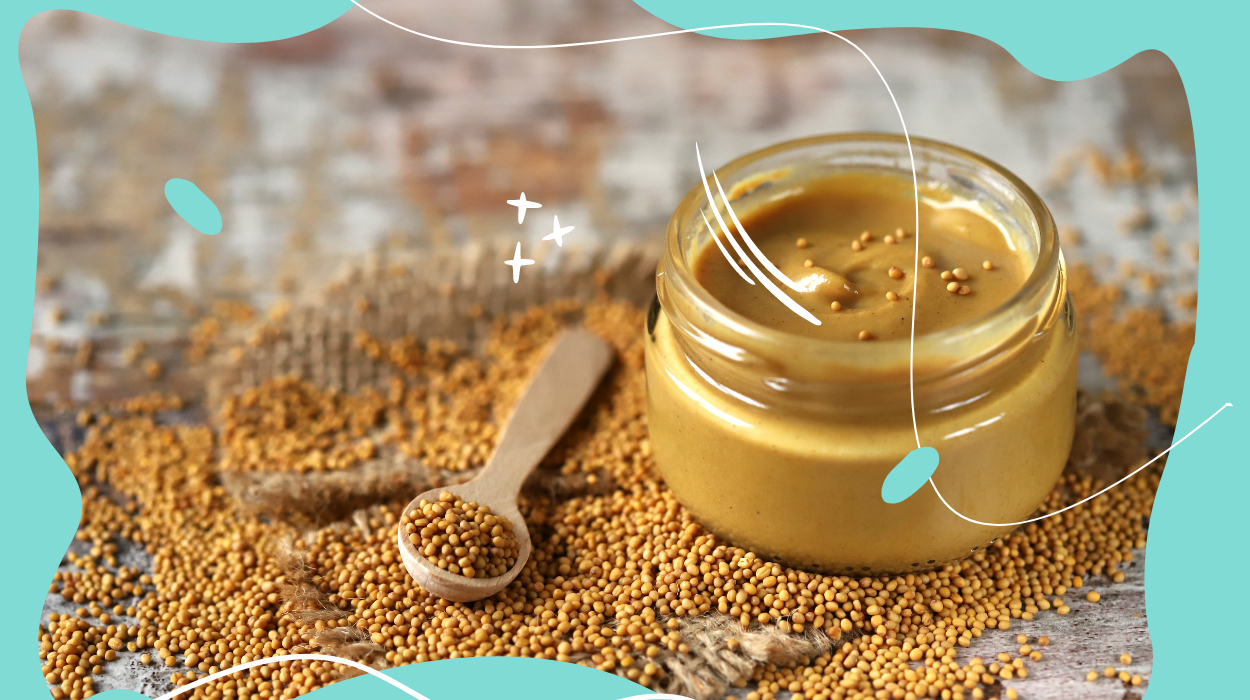 Evidence Based
Evidence Based
Evidence Based
This article is objectively based on relevant scientific literature, written by experienced medical writers, and fact-checked by a team of degreed medical experts.
Our team of registered dietitian nutritionists and licensed medical professionals seek to remain objective and unbiased while preserving the integrity of any scientific debate.
The articles contain evidence-based references from approved scientific sites. The numbers* in parentheses (*1,2,3) will take you to clickable links to our reputable sources.
Is Mustard Vegan & Safe For Vegan Consumption In 2024?

When it comes to vegan-friendly condiments, mustard often makes the list. But is mustard vegan? It is a question demanding a detailed answer.
As the popularity of the vegan diet continues to rise, understanding which condiments align with this lifestyle is essential.
In this article, we delve into the ingredients of mustard, exploring whether they fit into a vegan lifestyle and providing you with a better understanding of this vibrant condiment.
Is Mustard Vegan Friendly?
Yes, most mustards are vegan-friendly, typically containing mustard seeds, water, vinegar, salt, and spices.
However, certain varieties like honey mustard or some Dijon mustards might contain non-vegan ingredients such as honey or wine processed with animal products.
Therefore, it’s always best to check the label.
Is Mustard Considered Vegan?
Yes, mustard is mostly considered vegan. Why? The reason is simple, its ingredients. Traditional mustard[1] consists of mustard seeds, water, vinegar, salt, and sometimes turmeric.
Mustard seeds come from mustard plants.[2] They’re entirely vegan. No animal byproducts are involved in growing mustard seeds.
Vinegar, another key ingredient in mustard, comes from fermented ethanol.[3] It is plant-derived and vegan-friendly.
Turmeric is derived from a cultivated plant root.[4] It is one of the most common spices with its health effects. Tumeric is also used for its color in the food industry. It’s also vegan.
These ingredients are all plant-based, fitting well into any vegan food list.
However, remember that not all mustard types are vegan. Some may contain non-vegan ingredients. It’s crucial to read labels carefully.
What Is Mustard?
Mustard is a common condiment. It comes from mustard seeds found in the mustard plant. The seeds are made into a powder and mixed with water. It can also be mixed with vinegar or other liquids to form a paste. Some mustard types, like Dijon and brown, can include white wine.
Traditional yellow mustard often has turmeric, which gives it a bright color.
Mustard has a unique, tangy flavor. This flavor makes it a favorite in many diets around the world.
There are different types of mustard used in different cuisines worldwide. Each type varies based on the mustard seeds and additional ingredients used. In its simplest form, mustard contains only mustard seeds, water, and vinegar.
You may prefer different mustard seeds[5] according to the taste you want. If you like softer tastes, mustard with yellow mustard seeds is a good option for you. You can get a more spicy flavor with brown mustard seeds. If you like hotter tastes, then go for the black mustard seeds. Some mustards, like Dijon, also contain wine.[6]
Others, like English mustard, are mixed with water for a hotter taste.
With its distinct tangy flavor, mustard is a staple in many healthy diets worldwide.
Ingredients In Mustard
In general, mustard ingredients are simple and vegan-friendly. The main ingredient is mustard seeds. These seeds come from mustard plants. They give the mustard its characteristic flavor.
Water is another key ingredient in mustard. It helps create the right consistency. Vinegar is also added to mustard. This acidic liquid provides mustard’s tangy flavor.
Salt is used to enhance the taste. These four ingredients make mustard suitable for a vegan diet.
However, some mustards have additional ingredients. Honey mustard, for instance, includes honey which is an animal product.
Some Dijon mustards may contain white sugar and wine. The sugar issue is the way it’s processed. Some sugars are refined using bone char[7] which is widely used as a decolorizing filter that allows the sugar cane to be in a desired white color. Therefore, if you are vegan, you may pay attention to buying sugar from bone char-free sugar companies.
Besides sugar, the fining process in wine production doesn’t always include plant-based filters. You need to pay more attention when you eat Dijon mustard. Don’t forget to check the labels; if you are unsure about the ingredients, try contacting the manufacturer.
Vegan-Friendly Ingredients
- Mustard Seeds: The main ingredient, mustard seeds,[2] comes from mustard plants, making them 100% vegan. The type of seed used in vegan mustard determines the characteristic of its taste.
- Vinegar: This acidic liquid[3] helps to create mustard’s characteristic tang. It’s a vegan-friendly ingredient.
- Water: A universal solvent, water is used to achieve the desired consistency of mustard sauce and is vegan.
- Salt: It adds taste to mustard and is a vegan ingredient.
- Turmeric: Often used in yellow mustard for its bright color, turmeric is a plant-based spice[8] belonging to the ginger family, so it’s vegan.
- Garlic Powder: In many vegan mustard types, garlic powder[9] is added to increase the taste. Garlic is an aromatic plant and suitable for a vegan diet.
- Lemon Juice: Some mustard recipes might include lemon juice.[10] It’s a vegan-friendly acidic liquid.
- Apple Cider Vinegar: It’s a plant-based and vegan ingredient used in some types of mustard for a distinct taste.
- Grape Juice: It’s a plant-based[11] and vegan ingredient in some homemade mustard.
- Maple Syrup: Some mustard varieties may use this plant-derived sweetener,[12] making it a vegan-friendly ingredient.
- White Wine: White wine is often used in Dijon mustard, but ensure it’s a vegan-friendly wine, free from animal-based fining agents.
Non-Vegan Ingredients To Look Out For
When selecting vegan mustard, be vigilant of these potential non-vegan ingredients.
- Honey: Often found in honey mustard sauce, it’s not considered vegan[13] because it comes from bees.
- White Sugar: Some sugar is processed with bone char,[14] an animal product. Look for mustards sweetened with vegan sugar.
- Natural Flavors: This term can hide animal-derived ingredients.[15] It’s always good to inquire about these if you need clarification.
- Egg Yolks/Whites: Rare, but some gourmet mustards might use these. It is beneficial to check labels.
- Cream: Also rare, but some mustard recipes might include cream, a dairy product that is not vegan.
- Artificial Colors: Some might be tested on animals[16] or derived from them.
- Gelatin: Very uncommon, but if you see gelatin in the ingredient list, you should know that gelatin is derived from animal protein and not vegan.
Checking labels and asking manufacturers can help ensure your mustard fits your vegan lifestyle.
Variety Of Mustard
- Traditional Yellow Mustard: Known for its bright yellow color, it’s a classic. It’s typically vegan, using mustard seeds, turmeric, vinegar, water, and salt.
- Dijon Mustard: Originating from Dijon, France, it’s made with white wine. Check labels for vegan-friendly wine or any animal-based fining agents.
- Brown Mustard: It has a more robust flavor than yellow mustard. It’s often vegan but always double-check for any non-vegan additives.
- Honey Mustard: This sweet and tangy variety often contains honey. As honey isn’t vegan, this mustard variety isn’t vegan-friendly.
- Whole Grain Mustard: It’s made using whole mustard seeds. It’s generally vegan but look for non-vegan ingredients or additives.
- English Mustard: It’s hotter than many other mustards. Mostly, it’s vegan-friendly, but it’s always best to check labels.
- Grey Poupon: A type of Dijon mustard famous for its unique flavor. Ensure the white wine used is vegan.
- Spicy Brown Mustard: It’s generally vegan. But always check the labels for non-vegan ingredients.
As a part of the vegan community, making informed choices about your diet is essential. The vegan diet generally relies on fruits and veggies. But sometimes, finding vegan products can be challenging. Thus, some vegan people prefer vegan meal delivery services or meal replacement products to ensure they consume vegan-friendly products.
Remember to balance your diet with vitamins and minerals if you prefer a vegan lifestyle.
Always ask your doctor and registered dietitian before you use any supplements or green powders, even if they are totally vegan.
Final Words
While mustard is generally considered vegan, there can be exceptions based on the type of mustard and the ingredients used. Many mustards are vegan. However, always read labels, especially for processed or mass-produced mustards. They may contain non-vegan ingredients or additives.
Frequently Asked Questions
Yes, yellow mustard is vegan as it contains water, vinegar, mustard seed, salt, turmeric, and paprika.
Not all Dijon mustards are vegan mustard. The wine and sugar used in production may have been processed using animal-based fining agents.
Dijon mustard might not be vegan if the white wine used in its production involves animal-based fining agents.
+ 16 sources
Health Canal avoids using tertiary references. We have strict sourcing guidelines and rely on peer-reviewed studies, academic researches from medical associations and institutions. To ensure the accuracy of articles in Health Canal, you can read more about the editorial process here
- Office (2020). CPG Sec 525.575 Prepared Mustard – Composition. [online] U.S. Food and Drug Administration. Available at: https://www.fda.gov/regulatory-information/search-fda-guidance-documents/cpg-sec-525575-prepared-mustard-composition
- Lietzow, J. (2021). Biologically Active Compounds in Mustard Seeds: A Toxicological Perspective. [online] 10(9), pp.2089–2089. doi:https://doi.org/10.3390/foods10092089.
- Driss Ousaaid, Hamza Mechchate, Laaroussi, H., Hano, C., Meryem Bakour, Asmae El Ghouizi, Conte, R., Badiaa Lyoussi and Ilham ElArabi (2021). Fruits Vinegar: Quality Characteristics, Phytochemistry, and Functionality. [online] 27(1), pp.222–222. doi:https://doi.org/10.3390/molecules27010222.
- Javad Sharifi-Rad, Youssef El Rayess, Alain Abi Rizk, Sadaka, C., Raviella Zgheib, Zam, W., Sestito, S., Rapposelli, S., Katarzyna Neffe-Skocińska, Dorota Zielińska, Salehi, B., Setzer, W.N., Dosoky, N.S., Taheri, Y., Marc El Beyrouthy, Martorell, M., Elise Adrian Ostrander, Hafiz, Cho, W.C. and Maroyi, A. (2020). Turmeric and Its Major Compound Curcumin on Health: Bioactive Effects and Safety Profiles for Food, Pharmaceutical, Biotechnological and Medicinal Applications. [online] 11. doi:https://doi.org/10.3389/fphar.2020.01021.
- Muhammed Yusuf Çağlar, Veli Gök, Tomar, O. and Gökhan Akarca (2018). Determination of the Effect of Different Ground Mustard Seeds on Quality Characteristics of Meatballs. [online] 38(3), pp.530–543. doi:https://doi.org/10.5851/kosfa.2018.38.3.530.
- Usda.gov. (2023). FoodData Central. [online] Available at: https://fdc.nal.usda.gov/fdc-app.html#/food-details/668014/nutrients
- Piccirillo, C. (2023). Preparation, characterisation and applications of bone char, a food waste-derived sustainable material: A review. [online] 339, pp.117896–117896. doi:https://doi.org/10.1016/j.jenvman.2023.117896.
- Betül Kocaadam and Nevin Sanlier (2015). Curcumin, an active component of turmeric (Curcuma longa), and its effects on health. [online] 57(13), pp.2889–2895. doi:https://doi.org/10.1080/10408398.2015.1077195.
- Igarashi, I., Amany Magdy Beshbishy, Lamiaa Wasef, Elewa, A., Abdel-Daim, M.M., Abd, M.E., Taha, A.E., Abd-Elhakim, Y.M. and Hari Prasad Devkota (2020). Chemical Constituents and Pharmacological Activities of Garlic (Allium sativum L.): A Review. [online] 12(3), pp.872–872. doi:https://doi.org/10.3390/nu12030872.
- Usda.gov. (2023). FoodData Central. [online] Available at: https://fdc.nal.usda.gov/fdc-app.html#/food-details/167747/nutrients
- Usda.gov. (2023). FoodData Central. [online] Available at: https://fdc.nal.usda.gov/fdc-app.html#/food-details/2344819/nutrients
- Usda.gov. (2023). FoodData Central. [online] Available at: https://fdc.nal.usda.gov/fdc-app.html#/food-details/169661/nutrients
- Saeed Samarghandian, Tahereh Farkhondeh and Fariborz Samini (2017). Honey and Health: A Review of Recent Clinical Research. [online] 9(2), pp.121–127. doi:https://doi.org/10.4103/0974-8490.204647.
- U.S. Customs and Border Protection. (2020). CBP Modifies Withhold Release Order on Imports of Bone Black from Bonechar Carvão Ativado do Brasil Ltda. [online] Available at: https://www.cbp.gov/newsroom/national-media-release/cbp-modifies-withhold-release-order-imports-bone-black-bonechar-carv
- Murley, T. and Chambers, E. (2019). The Influence of Colorants, Flavorants and Product Identity on Perceptions of Naturalness. [online] 8(8), pp.317–317. doi:https://doi.org/10.3390/foods8080317.
- Office (2023). How Safe are Color Additives? [online] U.S. Food and Drug Administration. Available at: https://www.fda.gov/consumers/consumer-updates/how-safe-are-color-additives



